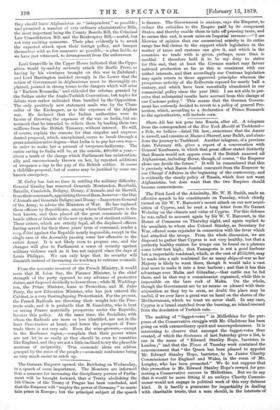Lord Granville in the Upper House indicated that the Oppo-
sition would by-and-by seriously attack Sir Bartle Frere, as having by his viewiness brought on this war in Zululand ; and Lord Hartington insisted strongly in the Lower that the action of Government in Afghanistan must be thoroughly ex- plained, pointed in strong terms to the dangers which will arise in " Eastern Roumelia," and ridiculed the reforms granted by the Sultan under the Anglo-Turkish Convention; but topics for debate were rather indicated than handled by the Opposition. The only positively new statement made was by the Chan- cellor of the Exchequer, as to the expenses of the Afghan war. He declared that the Indian authorities were in favour of throwing the expenses of the war on India, but an- nounced that he intended to relieve them by lending them two millions from the British Treasury, without interest. He will, of course, explain the reasons for that singular and unprece- dented proposal, which, unexplained, seems to break through a great administrative dogma—that India is to pay her own way— in order to make her a present of twopence-halfpenny. The entire saving to India will be, at the outside, £80,000 a year,— about a tenth of the charge which Parliament has unintention- ally and unconsciously thrown on her, by repeated additions of twopence a day to the pay of the British soldier. It seems a childlike proposal, but of course may be justified by some un- known emergency.


































 Previous page
Previous page